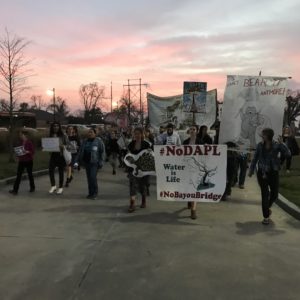As the Bayou Bridge pipeline nears what appears to be its inevitable completion, passions among anti-pipeline protesters run high, inspiring more aggressive actions–and, they say, a “brutal” backlash from police.
With 162-mile Louisiana pipeline project due to be completed in October, the few remaining protesters in the L’Eau Est La Vie (“Water is Life” in French) camp are becoming increasingly aggressive. In particular they are “disrupting” business at Chase Bank locations to oppose the bank’s financial backing of the project. Like previous protests of banks funding pipeline projects like the Dakota Access Pipeline Project in 2016, these haven’t been successful.
“We’re just trying to get protection from the people who create space for this company to continue to brutalize us,” says Cheryl Foytin, who led a group of protesters into the Chase Bank branch in St. Martin’s parish with shouts of “Stop ETP.” The protesters demanded to speak with a bank executive.
Instead, when a group of “L’eau Est La Vie” protesters disrupted a a Chase Bank branch in St. Martin’s Parish, Louisiana, they were arrested.
“St Martin’s Sheriff illegally arrested at a member of our Leadership Council and a member of the press at a public boat ramp. Bail has been set at $31,000,” the group claimed in a statement. “They were charged with felony critical infrastructure trespass, despite having just arrived at a public boat ramp.”
The two arrestees appear to be Karen Savage and Anne White Hat, according to posts from the sheriff’s department. According to the protesters, Chase Bank was partially responsible for their alleged harsh treatment by police.
“Police keep brutalizing us every time we go out to land where we are supposed to be on and the only reason they do that is because ETP [Energy Transfer Partners, the company building the pipeline] has bought and paid for them. And the only reason they’re paid for is because Chase Bank keeps giving them money,” yelled one protester.
The videos show how protest activity is becoming increasingly vocal, though still has yet to reach the numerical strength seen at Standing Rock. Even so, recent protest activity is resulting in more arrests, in part because of a newly-enacted Louisiana state law which makes it a felony to interfere with the construction of “critical energy infrastructure.”
The latest batch of arrests also shows that Bayou Bridge, like Standing Rock, is being covered by activist journalists who often take a hands-on approach to covering protest activity. One of the people arrested by the St. Martin Sheriff included Karen Savage, who writes for Bridge the Gulf, a self-described “community media project” for the Gulf Coast. In stories posted over the course of the summer, Savage covered claims by protesters that law enforcement was failing to protect them from pipeline workers.
Protesters have been contesting the arrests, and the $30,000 bail set on the two, saying that they had permission to be on the property.
Even so, the situation demonstrates how heated interactions between police and protesters have become as the project comes to a close. The Bayou Bridge pipeline may be nearly complete, but protest activity seems to be only ramping up.

